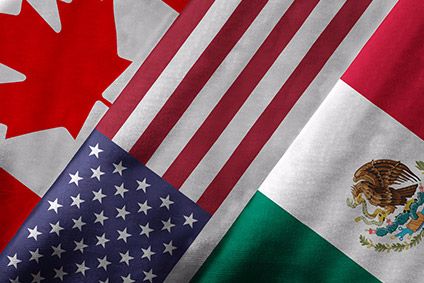
Forced labour, sustainability and trade policies will all feature in the ongoing implementation of the US-Mexico-Canada Agreement (USMCA), in addition to bolstering supply chains in the areas of clean and emerging technologies.
Ahead of the first-ever USMCA Free Trade Commission Meeting on 18 May, US Trade Representative Katherine Tai said the Agreement’s bipartisan support in the US Congress is a charge to action.
“For this agreement to be durable, it must serve the needs of everyday people – not just in the United States, but in Mexico and Canada as well. That will only happen if we deliver on our promises.
“For too long, the focus has been on global value chains, as a proxy for maximising efficiency. That efficiency has proven to be detrimentally expensive.
“Not only have we discovered the fragility of our supply chains, but we have just begun to appreciate the degree to which they run counter to our collective goals of ensuring that workers within North America, and outside it, are paid a fair wage, in a safe workplace.”
Tai said the three countries agreed to bar the import of goods made in whole, or in part, with forced labour. “Unfolding events are showing us the importance of that commitment. We are living our values by stopping these goods at the border.”

US Tariffs are shifting - will you react or anticipate?
Don’t let policy changes catch you off guard. Stay proactive with real-time data and expert analysis.
By GlobalDataIn addition, Tai said North America should lead in the collective fight against climate change in order to promote sustainability, with the USMCA serving as a platform for future cooperation and prosperity.
“Our emission reduction pledges and strategic investments in innovative technologies provide complementary tools to address the climate crisis.
“If we choose to be strategic, bold, and innovative, we can bolster existing supply chains and develop new ones in the areas of clean and emerging technologies.”
In a joint statement following the meeting, Tai, Canadian Minister of Small Business, Export Promotion, and International Trade Mary Ng, and Secretary for Economy Tatiana Clouthier, said they had held “robust forward-looking discussions” on the USMCA’s landmark labour and environment obligations.
“These commitments set the standard for future trade agreements and should serve as examples to advance workers’ rights and the nexus between environmental issues and trade,” they said.
In particular, the countries affirmed their desire to champion trade policies that support good jobs that are protected by robust and fully enforced labour laws. The agreement seeks to raise standards for workers in North America, including those related to freedom of association and the right to collective bargaining.
They also acknowledged that trade and environmental policies are mutually supportive and that trade can provide legitimate and innovative opportunities to address environmental concerns such as wildlife trafficking, illegal logging and fishing, and marine litter.
The parties also discussed ways to address environmental issues and exchanged views on the possible exploration of areas to cooperate, including on trade-related climate change measures.
“As our countries continue to combat the Covid-19 pandemic and continue our shared recovery from an economic downturn that has disproportionally impacted SMEs and under-represented communities, we recognise that the USMCA has an important role to play in revitalising our region,” their statement read. “As we continue implementing the USMCA and ensuring that this Agreement benefits those that have historically been left behind by trade agreements, the parties have agreed to continue to hold engagement meetings with underserved communities and to hold a Trade Deputies meeting before the end of this year to assess progress on the areas highlighted and identify ongoing opportunities for future engagement.”
The USMCA came into force on 1 July 2020. It makes a number of updates and modifications to the 25-year-old North American Free Trade Agreement (NAFTA) and will offer qualifying textiles and apparel, travel goods and footwear originating from the USMCA region duty-free access to the US and Canadian markets.
It also includes new provisions on textiles that incentivise greater North American production, strengthens customs enforcement, and facilitate broader consultation and cooperation among the three parties.



